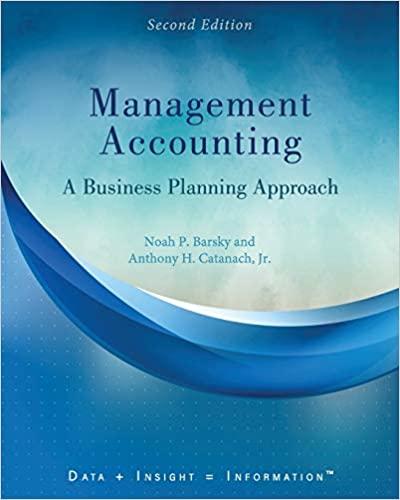Question
Alexa asks you to find out the unit selling price Solmarex should assign to each of product line to maximize net income for the second
Alexa asks you to find out the unit selling price Solmarex should assign to each of product line to maximize net income for the second six months of the year. Also, based on the unit prices you have chosen, indicate the company's expected income before taxes for the second six months of the year (support your answer with an income statement prepared in the contribution margin format. Show the contribution margin and the segment margin for each product).
|
| Gen x | Gen Y | Total |
| Contribution margin |
|
|
|
| Direct fixed expenses |
|
|
|
| Segment margin |
|
|
|
| Selling and admin fixed |
|
|
|
| Operating income |
|
|
|
It is important to know if based on the unit prices you have chosen if company should drop GenX product for the second six months of the year.
As you were about to wrap up the meeting Alexa mentions an opportunity to outsource production of the GenX line. Alexa informs you of a local manufacturer, Fastteck Inc., who has offered to make GenX product for $13 per case. Solmarex would sell the product to its existing customers. This would mean that Solmarex could use its idle resources to make a new a new line of hardware called GenZ. Management believes the company could sell 45,000 units of this new product for $40 per case; variable selling and administrative expenses would be $7 per case. They expect that introducing this product will reduce current unit sales of the GenY product by 10%. What is the maximum variable cost per unit of the Gen Z product that would make this proposition worthwhile?
To calculate the maximum variable cost per unit of the Gen Z product:
CM of Gen X (You have data) + Gen Y (You have data) + CM Gen Z (you need to put X for variable product cost = $CM above
Find X, X = is the maximum variable cost per unit of the Gen Z product
Solmarex Inc. has a June 30th year-end. It has developed two key hardware components; Gen X and Gen Y. The forecasted operating results for the first six months of the year are presented in the following statement.
| Solmarex Inc. Forecasted Result of Operations For the six months ended Dec 31 (in thousands) | |||
|
| GenX | GenY | Total |
| Units | 100 | 100 | 200 |
| Sales revenue | $2,000 | $3,000 | $5,000 |
| Cost of goods sold | 1,600 | 1,900 | 3,500 |
| Gross profit | $400 | $1,100 | $1,500 |
| Selling & administrative expenses |
|
|
|
| Variable | $400 | $700 | $1,100 |
| Fixeda | 240 | 360 | 600 |
| Total selling & administrative expenses | $640 | $1,060 | $1,700 |
| Income (loss) before taxes | $(240) | $40 | $(200) |
a Fixed selling & administrative expenses are allocated between the two products on the basis of relative sales dollars. These expenses are avoidable only if the entire plant is closed.
The product costs per unit are as follows:
|
| GenX | GenY |
| Direct materials | $7 | $8 |
| Direct labor | 4 | 4 |
| Variable manufacturing overhead | 1 | 2 |
| Fixed manufacturing overhead | 4 | 5 |
| Total product cost | $16 | $19 |
Each product is manufactured on a separate production line. Normal manufacturing capacity is 200,000 units of each product per year. However, the plant is capable of producing 250,000 units of the GenX product and 350,000 units of the GenY product per year. Capacity levels assume an even flow of production throughout the year, so that the maximum capacity for the second half of the year is 125,000 units of GenX and 175,000 of GenY units.
Alexa provides you the following schedule reflecting price/volume alternatives for the products in the second six months of the year. These are essentially the same alternatives facing Alexa during the first six months of the year.
| GenX | GenY | ||
| Alternative Prices (per Unit) | Unit Sales Volume | Alternative Prices (per Unit) | Unit Sales Volume |
| $18 | 120,000 | $25 | 175,000 |
| 20 | 100,000 | 27 | 140,000 |
| 21 | 90,000 | 30 | 100,000 |
| 22 | 80,000 | 32 | 55,000 |
| 23 | 50,000 | 35 | 35,000 |
Alexa believes the company's loss for the first six months of the year reflects a tight profit margin caused by intense competition. Alexa also believes that many companies will be forced out of this market by the next year and that long-term profits should improve.
Alexa provides you this additional information:
Fixed manufacturing overhead per unit is based on normal manufacturing capacity.
Depreciation constitutes 50% of the fixed manufacturing overhead cost of each product and is unavoidable.
The remaining fixed manufacturing overhead expenses arise from factory personnel assigned to particular products.
Variable selling and administrative expenses are $4 and $7 per unit, respectively, for the GenX and GenY products.
Step by Step Solution
There are 3 Steps involved in it
Step: 1

Get Instant Access to Expert-Tailored Solutions
See step-by-step solutions with expert insights and AI powered tools for academic success
Step: 2

Step: 3

Ace Your Homework with AI
Get the answers you need in no time with our AI-driven, step-by-step assistance
Get Started


